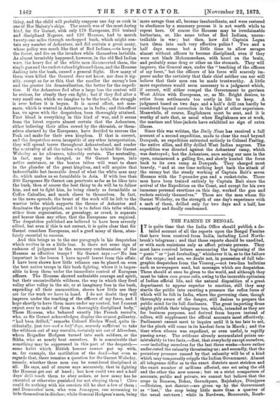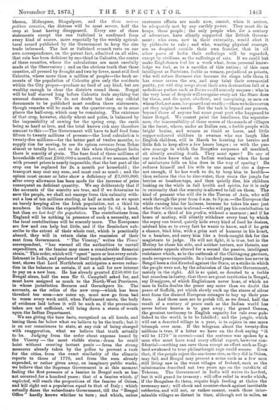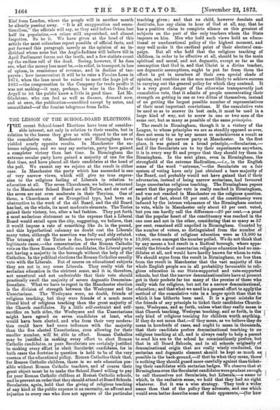THE FAMINE IN BENGAL.
IT T is quite time that the India Office should publish a de- tailed account of all the reports upon the Bengal Famine that have been received from India, including Lord North- brook's telegrams ; and that these reports should be unedited, or with such omissions only as affect private persons. They must have received letters announcing the beginning of the " panic " or " just foreboding," whichever it is, as to the failure of the crops ; and are, we doubt not, in possession of full tele- graphic despatches from the Viceroyf—not two-line bulletins such as newspapers send, but messages which are despatches. These should at once be given to the world, and although they must be taken cum grand salis, owing to the incurable optimism of Indian official life, and the natural disposition of a great department to appear superior to emotion, still they may startle the public into exerting a pressure the reflex force of which will be felt in India, where the governing class, though thoroughly aware of the danger, still desires to prepare the public mind for its full disclosure. The great importing firms might publish their telegrams too, which, intended as they are for business purposes, and derived from buyers instead of sellers, will supplement the official accounts most effectively. Parliament cannot meet to inquire until it is too late to act, for the pinch will come in its hardest form in March ; and the time when silence was expedient, or even useful, is rapidly passing away. The evidence already accumulated points un- mistakably to two facts,—first, that everybody except ourselves, —or including ourselves for the last three weeks—have rather under-rated the calamity threatening us ; and secondly, that the pecuniary pressure caused by that calamity will be of a kind which may temporarily cripple the Indian Government. Almost all telegrams differ as to the exact districts most stricken and the exact number of millions affected, one set using the old and the other the new census ; but on a strict comparison of accounts, public and private, we cannot but believe that the crops in Benares, Behar, Gornckpore, Rajahahye, Dinajpore —Division, not district—are given up by the Government as "lost," the crop being little more than a quarter of the usual out-turn ; while in Burdwan, Ban000rah, Beerb- bhoom, Midnapore, Bhagulpore, and the three metro- politan counties, the distress will be most severe, half the crop at least having disappeared. Every one of these statements except the one italicised is confirmed from every kind of source, more especially by the weekly agricul- tural record published by the Government to keep the rice trade informed. The last or italicised remark rests on our own correspondence, on the patent fact, admitted on all sides, that rain has been deficient by one-third in Calcutta, the centre of these counties, where the calculations are most carefully made at the Observatory ; and on the obvious truth that these counties, all pressed by drought and two by fever, must still feed Calcutta, where more than a million of people—the book ac- counts of the population of Calcutta give only the residents within the City proper—produce no food of any kind, but are wealthy enough to clear the districts round them. Bengal will be half starved long before Calcutta feels anything but unusual dearness. We do not doubt but that any official documents to be published must confirm these statements, though remarks will be made on the quarter-crop, or in some places the half-crop, which may be remaining. The existence of that crop, however, chiefly wheat and pulse, is balanced by the impossibility of sowing for the spring crop, the earth being as hard as iron, and the total known risk may therefore amount to this :—The Government will have to half feed from fifteen to twenty millions of persons—the local calculation is twenty-five millions—for the better part of twelve months, to supply rice for sowing, to see its opium revenue from Behar almost or totally lost, and to do this when throughout India there is scarcity of grain. The bare food of three millions of households will cost £300,000 a month, even if we assume, what with present prices is nearly impossible; that the lost part of the crop can be replaced for 2s. a month per household ; the transport may cost any sum, and must cost as much ; and the opium must sooner or later show a deficiency of £3,000;000, after every allowance has been made for the increase of price consequent on deficient quantity. We say deliberately that if the accounts of the scarcity are true, and if we determine to save the people, we shall not emerge from this calamity with- out a loss -of ten millions sterling, or half as much as we spent on barely keeping alive the Irish population, not a third its numbers. In Orissa the expenditure was only 7s. 6d. a head, but then we lost half the population. The contributions from England will be nothing in presence of such a necessity, and the local contributions will be scarcely more. The Europeans are few and can help but little, and if the &minders sub- scribe to the extent of their whole rent, which is practically absurd, they will in return claim the remission of their rent from Government. " The Viceroy," writes the Times' correspondent, " has warned all the authorities to curtail expenditure, as the famine may cause a considerable financial strain." This order, which will "upset " more or less every estab- lishment in India, and produce of itself much misery and discon- tent, shows that Lord Northbrook anticipates a severe reduc- tion in the balances as certain, if not a call for new interest to pay on a new loan. He has already granted £250,000 for Bengal alone, half the Kim Sir G. Campbell asked for, and must have assigned as -much to the North-West Provinces, in -whose jurisdiction Benares 'and Goruckpore lie. The accounts, as the relics of the anew crop—which has been threshed too soon—are eaten up, must now go from bad to worse every week until, when Parliament meets, 'the body of evidence laid before it will be such as, if the precautions taken are not sufficient, will bring down a storm of wrath upon. the Indian Department.
We are giving the bare facts, recognised on all hands, and toning them far below what we believe to be the truth; but it is on our consciences to state, at any risk of being charged with exaggeration, what we believe that truth actually to be. Judging from the order about expense issued by the Viceroy — the most visible storm - drum he could hoist without creating instant panic —:from the strong, measures already taken by the police to prevent a rush for the cities, from the exact similarity of the climatic reports to those of 1770, and from the sum already expended, or rather given away, on imaginary public works, we believe that the Supreme Government is at this moment feeling the first pressure of a famine in Bengal such as has not occurred for a hundred years ; that of a famine which, if neglected, will reach the proportions of the famine of Orissa, and kill right out a population equal to that of Italy ; which actually dazes the subordinate Government, till the "Bengal Office " hardly knows whither to turn ; and which, unless enormous efforts are made now, cannot, when it arrives, be adequately met by any earthly power. They must die in heaps, these people ; the only people who, for a century of adventure, have silently supported the British Govern- ment ; who even, now in their extremity, would elect it by plebiscite to rule ; and who, wanting physical courage, are so despised outside their own frontier, that in all other parts of India their sufferings will be regarded except by civilians, as the sufferings of rats. If we could but make Englishmen feel for a week what, from personal know- ledge we feel, as to a sacrifice of this nation ; of this race intelligent as Parisians, feeble as women, prejudiced as priests, who will refuse Burmese rice because its shape tells them it has come across the sea, and may taint their ceremonial purity, yet will sing songs about their own destruction full of a melodious pathos such as Burns could scarcely surpass ; who in the very hour of despair will recognise every act the State does for them, and die quiet, obedient, and unrepining, as men on whom God, not man, has poured out wrath ;—then we believe even yet they might be saved. But the task is beyond our powers, beyond those of anyone but some great poet who happened to know Bengal. We cannot paint the loneliness, the separate- ness, the inaccessibility of those scores of thousands of villages in the forest, where, under an Italian sun, a feeble people with bright brains, and women as timid as hares, and little copper-coloured children in swarms who can laugh like English children, will in March be hunting for berries and little fish to keep alive a few hours longer ; or with the pas- sive courage in which the Bengalee surpasses all mankind, sit silently awaiting death. They must spare ? Do any of our readers know what an Indian workman when the hour of misfortune falls on him does in the way of sparing ? He reduces himself and his wife to one meal of rice a day— not enough, if he has work to do, to keep him in health-- then reduces the rice to rice-water, then routs the jungle for berries or bamboo-tops, and then quietly dies, his children looking on the while in full health and spirits, for it is only in extremity that the scarcity is allowed to fall on them. The kind of peasant who will die is the Tuscan of Asia, who will work through the year from 3 a.m. to 3 p.m.—the European the while cursing him for laziness, because he takes his ease just when the white man is abroad—who will pay his contribution to the State, a third of his profits, without a murmur ; and if he hears of mutiny, will silently withdraw every boat by which the sepoy can travel, quietly hide every kind of food he desires, mislead him as to every fact he wants to know, and if he gets a chance, bind him, with a grim sort of humour in his heart, to a bamboo, and carry him like a fresh-caught fish for the magistrate to judge. He will not fight, it is true, but in the Mutiny he chose his side, and neither torture, nor threats, nor passionate appeals altered for a second the passive, intelligent resistance which, as in the outbreak of the Chittagong garrison, made escape so impossible. In a hundred years there has never in Bengal been a riot directed against the State, or a strike in which the people were not, by the admission of the white Government, mainly in the right. All is so quiet, so devoted to a feeble but ceaseless industry, that there are great territories in Bengal, say Dinajpore, of which Englishmen never hear, of which no man in India doubts the peace any more than we doubt the peace of Suffolk, yet which slowly suck up the stores of silver sent from the disused European coinages to buy up their pro- duce. And these men are to perish till, as we dread, half the result of a century of peace such as the Indian world has never before known is to pass away ; the grand Census, the greatest testimony to English capacity for rule ever pub- lished to the world, is to be falsified ; and the jungle, which will eat a deserted village in a year, is to rejoice in one more triumph over man. If the telegram about the twenty-five millions is true, if a letter we have on the desk saying "it will be 1770 " is correct—and the sentence was spoken by a man who must have read every official report, however con- fidential—nothing can save them except an effort such as Eng- land awakened to true philanthropic rage could secure. Even that, if the people reject the sea-borne rice, as they did in Orissa, may fail, and Bengal may present a scene such as a few men still living saw in the worst villages of Ireland, such as the missionaries described not two years ago on the outskirts of Teheran. The Government in India will strive its hardest, but it will guard its treasury ; will offer relief in works which, if the Bengalees do them, require high feeding at thrice the necessary cost; will check and counter-check against inevitable robberies, and will not, or rather cannot, reach those inter- minable villages as distant in time, although not in miles, as
Kief from London, where the people will in another month be silently passing away. " It is all exaggeration and sensa- tionalism," the officials will say, as they said before Orissa lost half its population,—a crime still unpunished, and almost forgotten. So be it. We have given at the head of this article the most colourless report possible of official facts, and put forward this paragraph merely as the opinion of an in- dividual whom none but the Anglo-Indians will believe till in April Parliament forces out the truth, and a few statists count up the endless roll of the dead. Seeing, however, if he does see, what the money loss must be,—in relief, in transport, in loss of opium, in remissions of revenue, and in decline of tax- payers ; how inconvenient it will be to raise a Famine Loan in 1874, when the loan must be raised to meet the huge job of 1833—the compensation to the Company for trade profits it was not making—it may, perhaps, be wise in the Duke of Argyll to let the public know a little in good time. Let Mr. Gladstone, who can feel as well as finance, demand now, and at once, the publication—unedited except by notes, and unmutilated—of the famine telegrams from India.




































 Previous page
Previous page